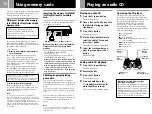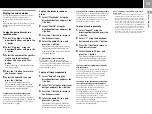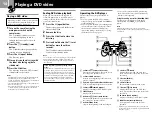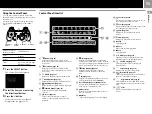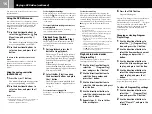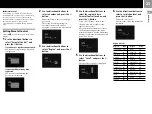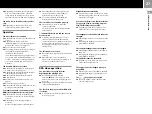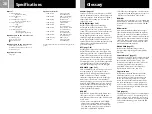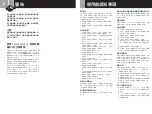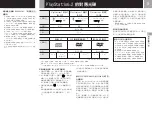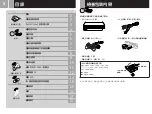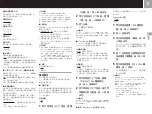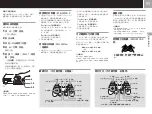
26
Please go through this
section if you experience
difficulty in operating the
PlayStation
®
2 console.
• If you experience any of the following
difficulties, use this troubleshooting
guide to help remedy the problem before
requesting repair. Should any problem
persist, call the PlayStation
®
service line
number listed on your warranty card for
technical assistance.
• Make sure the AC power cord is
connected to the console and the wall
outlet, and the TV (or VCR) or the
supplied accessories are connected to the
console correctly.
Power
The power is not turned on.
,
Check that the AC power cord is connected
securely.
,
The console is not turned on. Turn on the
console using the main power switch on
the console rear.
Picture
There is no picture.
,
Check that the console is connected to the
TV (or VCR) with the AV cable (integrated
audio/video).
,
Check that the console and the TV (or
VCR) are turned on.
,
Check that you have selected the video
input on the TV (or VCR).
,
Check that the AV cable (integrated audio/
video) is connected securely.
,
Check that the inserted disc can be played
with this console (see page 3).
,
Check that the disc is placed with the label
side facing up (data side down).
,
The disc is not inserted correctly.
,
DVD playback has been stopped.
,
Try another set of AV cables .
,
The progressive scan option is set to “On”
when using a TV that does not support
progressive scan (480p), or when using a
cable other than the component AV cable
(for PlayStation
®
2).
With the DVD inserted in the console, press
the
1
(standby)/reset button on the
console front. Then hold down the START
button of the analog controller
(DUALSHOCK
®
2) inserted into controller
port 1 until the DVD picture is displayed.
When DVD playback begins, “Progressive”
will be set to “Off”, allowing the DVD
video to be displayed as normal.
“Progressive” can also be set to “Off” in the
Version Information screen (page 9).
Picture noise appears.
,
The console is placed on an unstable
surface. Place the console on a stable and
flat surface. Do not shake or vibrate the
console.
,
Clean the disc.
,
Moisture has condensed inside the console
(see page 2).
,
If the video signal from the console has to
go through the VCR to get to the TV, the
copy protection applied to some DVD
videos could affect picture quality. When
playing a DVD video, connect the console
to the TV directly (see page 6).
,
The progressive scan option is set to “On”
when using a TV that does not support
progressive scan (480p), or when using a
cable other than the component AV cable
(for PlayStation
®
2).
Do not open the disc tray or remove the
DVD. With the DVD inserted in the
console, press the
1
(standby)/reset button
on the console front. Then hold down the
START button of the analog controller
(DUALSHOCK
®
2) inserted into controller
port 1 until the DVD picture is displayed.
When DVD playback begins, “Progressive”
will be set to “Off”, allowing the DVD
video to be displayed as normal.
“Progressive” can also be set to “Off” in the
Version Information screen (page 9).
,
Some video images appear unnatural when
using progressive scan, even when the TV
supports progressive mode.
Set “Progressive” to “Off”, and view in
standard interlace mode.
The aspect ratio cannot be changed
according to the TV when playing wide
picture DVD videos.
,
Depending on the disc, the aspect ratio is
fixed.
,
Check that the console is connected to the
TV directly. (The selector or receiver
(amplifier) may be connected between the
console and the TV.)
,
Depending on the TV, the aspect ratio is
fixed.
When playing a DVD-RW disc recorded in VR
mode, the message “Playback is restricted.
Cannot play.” is displayed on the screen and
then the screen turns blue.
,
You may be playing a disc that contains
“copy-once” content. Video recorded on
CPRM-compatible DVD-RW discs using
the copy-once feature cannot be played
back. For details, see “Notes on the
playback of DVD-R/DVD-RW/DVD+R/
DVD+RW discs” on page 3.
Sound
There is no sound.
,
Check that the console is connected to the
TV (or VCR) with the AV cable (integrated
audio/video).
,
Check that the console and the TV (or VCR)
are turned on.
,
Check that you have selected the video
input on the TV (or VCR).
,
Check that the TV volume is set properly or
“mute” is not selected on the TV.
,
Check that the AV cable (integrated audio/
video) is connected securely.
,
Check that the inserted disc can be played
with this console. (see page 3)
,
Check that the disc is placed with the label
side facing up (data side down).
,
Check that you have connected the console
to the audio input connectors on the receiver
(amplifier) correctly. Refer also to the
instructions supplied with your amplifier.
,
Try another set of AV cables.
,
Check the speaker connections and
settings. Refer also to the instructions
supplied with your amplifier.
,
Check that you have selected the
appropriate input on the receiver
(amplifier) so that you can listen to sound
from the console. Refer also to the
instructions supplied with your amplifier.
,
The console is in pause mode.
,
The console is in search/slow-motion mode
(when playing a DVD video).
,
You are playing an audio CD or DVD with
a DTS audio track.
Do not play back DTS audio tracks when
the console is connected to an audio device
without a built-in DTS decoder (see page
24).
,
The system setting is not correct for when
the console is connected to audio
equipment with DIGITAL OUT (OPTICAL)
connectors (see page 7).
Poor sound quality.
,
The console is placed on an unstable surface.
Place the console on a stable and flat surface.
Do not shake or vibrate the console.
,
Clean the disc.
,
Moisture has condensed on the disc
(see page 2).
,
You are playing an audio CD or a DVD
with DTS audio tracks.
You can play an audio CD or DVD with
DTS audio tracks only when the console is
connected to audio equipment with a built-
in DTS decoder.
The surround effect is difficult to hear when
you are playing a DVD video with a Dolby
Digital audio track.
,
Check the speaker connections and settings.
Refer to the operating manual of your
receiver (amplifier).
Troubleshooting

